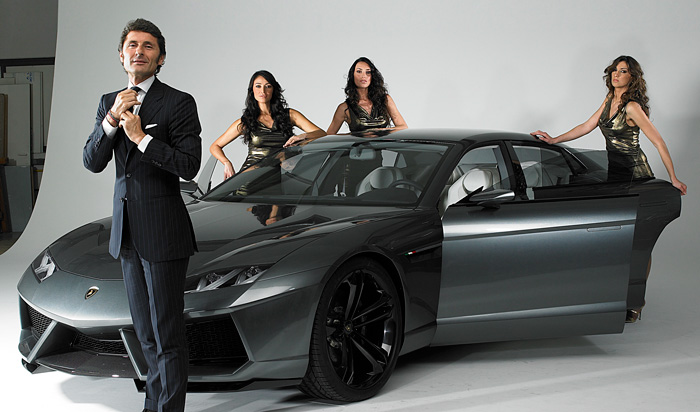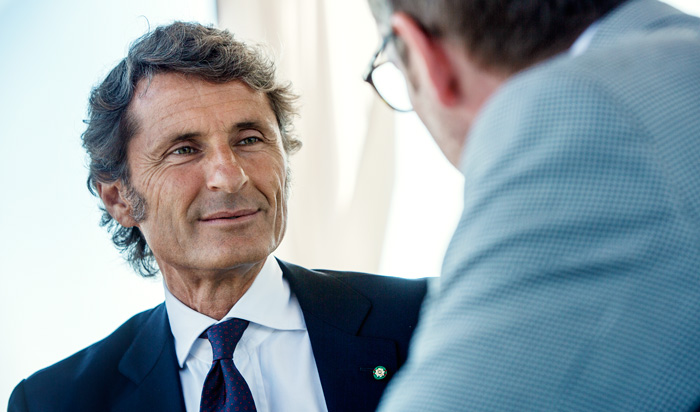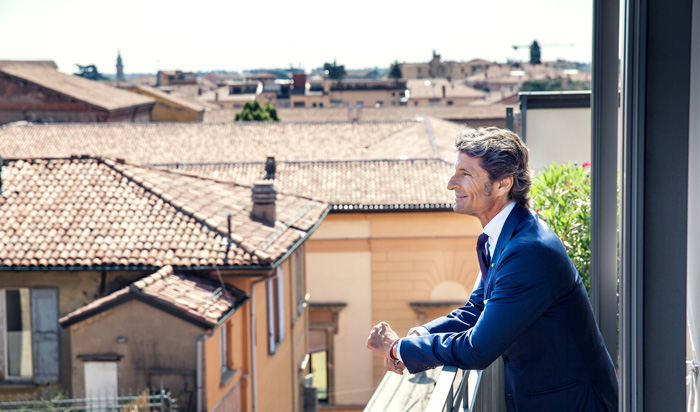
Meet Lamborghini's big boss
No car boss is more suave than Lamborghini CEO Stephan Winkelmann. As the elevator decants him onto the rooftop of our central Bologna hotel location, the aura is palpable. In a role that requires being both boffin and bean-counter, it's fitting that the boss of the world's most reliably extreme super sports car company appears to be so calculatedly cool. The shoes, suit and sideburns are all sharp.
But he's also a survivor. He'll have piloted Lamborghini for a decade come 2015, adding volume and quality to a previously wayward brand while riding the vicissitudes of the darkest economic downturn since the Great Depression. Not to mention the equally volatile internal politics of its Volkswagen Group parent. Revenues in 2013 topped £404 million, up from £369 million the previous year, with further growth expected this year as the Huracán gets off to a flying start.
With the cicadas chirping and church bells clanging, we take our seats. Some background first. Winkelmann served as a paratrooper in the German army. He also worked for 11 years in the Fiat Group. The last film he watched and really enjoyed was American Hustle ("I loved the soundtrack and the performances. Especially the women...") A number of brightly coloured bands decorate his wrists. His favourite Lamborghinis are the Miura Jota and 350GT. He cites Winston Churchill as an influence and enjoys Ernest Hemingway. He is fluent in English, Italian, German and French.
He was also recently awarded the Knight Grand Cross by the Italian establishment. Tellingly, there's little self-aggrandisement. "I received it for Lamborghini," he says. "It's important because it was awarded in recognition of the company and the team, not me."
TopGear: Lamborghini must make the city very proud. How significant is its connection to Bologna?
Stephan Winkelmann: The city has around 400,000 inhabitants, so it's still a human kind of place. The people here tend to recognise the value that a brand like ours has for the city. It's very positive. We feel it. We try to do as much as we can for the territory; we have an ethical responsibility.
TG: You were born in Berlin, but grew up in Italy. In your heart, where do you belong?
SW: I feel more Italian than anything else. But I don't really belong to one nationality. I live most of the time in Italy, and other people tend to regard me as Italian. But when I look at myself, I see someone
who is European.
TG: Are you pro-European?
SW: Yes. I grew up in Rome, and I recognise the beauty, especially when I'm with people from other countries. But you also see what's going on underneath those rooftops... In terms of the brand, Lamborghini's Italianness is vital. The people who work in the company are mostly from this region, and they really put their imprint on everything they do. This has been the case for decades, and it's extremely positive. Luxury brands need their roots, they need to have a reference, and there is nothing more important in life than for people to know where they come from. History has a value and for a car manufacturer - for luxury brands in general - heritage is hugely important. You can see how difficult it is for brands stepping into the market who don't have it.
Top Gear
Newsletter
Thank you for subscribing to our newsletter. Look out for your regular round-up of news, reviews and offers in your inbox.
Get all the latest news, reviews and exclusives, direct to your inbox.
TG: Italy is one of the most seductive countries in the world. But it can also be a tricky place to get things done. How would you describe your management style?
SW: The starting point is with the people you employ. Even if you have a strong vision, you need to let others confront you, so that you become certain about the ideas you are trying to impose. I have also learnt that you have to give people a degree of freedom. If you want them with you when there are tough times - and there will always be tough times - you have to give them some freedom. If you demand too much, people tend to explode, and they don't do the things you need them to do because they're no longer focused. So
you have to find the balance, you have to know them well, over a long time period. Chemistry is very important, especially in a company like Lamborghini.
TG: Do you know the names of everyone who works for you?
SW: No. It's impossible. There are about 1,300 of them. But I know quite a lot of the people at Lamborghini personally.
TG: This is a challenging modus operandi you are describing here.
SW: We want to maintain a family atmosphere, with an openness and kindness, but we are growing fast, in terms of numbers and employees, in terms of internationalisation, and the need to be process-oriented and professional... it's a big clash, yes. If you suck out all the blood and treat your people like robots, you lose it. You cannot be overly rational. Our approach isn't just product and technology driven, it is also part of a dream. We are not just technocrats. Plus, the cars should always be in the spotlight, not us.
TG: It must still be tempting to cast yourself in the mould of great personalities in the Italian supercar business, like Enzo Ferrari or Ferruccio Lamborghini.
SW: The only thing I recognise is that people are constantly watching you; they will judge you whatever you do, so you have to be consistent. You have to be careful in your behaviour, and not be too crazy, because the fact of the matter is that people will cast you as a role model, whether you like it or not.
TG: Is that a pressure? Do you wake up in the morning and think, "I'm the CEO of Lamborghini"? You are managing your own personal brand as much as the company's.
SW: [laughs] No! You get used to it. I am friends with many people outside of the business, and they will criticise me rather than mythologise me. The important thing is that I am consistent with myself. I never change. I hear things that people say and you know it's bulls**t. My values come from my parents and friends. I had the good luck to have a strong family.
TG: What did your father do?
SW: He was a diplomat who worked for the United Nations. This was the reason we moved to Rome. When I am faced with a certain situation, I think: "How would my father have dealt with this?" I rarely asked him for advice, but when I did he was there with observations that were very... concrete. He was a role model, not for what he said but for how he lived. I have kept the same friends since early childhood. We see each other from time to time, still, and we are all very honest with each other.
TG: You'll celebrate your 10th anniversary as CEO of Lamborghini next year. That's a fine achievement within the VW Group.
SW: My boss is Rupert Stadler, but I was hired by Martin Winterkorn when he was head of Audi. Stadler was the CFO, so I've known him since the beginning. They are two strong personalities, and I'm happy if they have the confidence to leave me here. All the rest is imagination. [pause] There is constant dialogue. We don't operate in a straight line - we go a bit left, a bit right, but always with one main direction. I think this is the right approach. But, if in five or six years we have missed our target, well that's a different story.
TG: The last decade has been dominated by the rise of tech start-ups - Google, Apple, Facebook, you know the names. Don't you think the automobile suddenly risks looking very 20th-century?
SW: But cars are still on everybody's mind. We have a chance to stay big, now and in the future. We may not be leaders in certain technological aspects, but the combination of factors means that ours is still the most complex business. Our designers, our engineers, our dealers and suppliers... they all go crazy. It really is so complex. When the earthquake hit this area [in 2012], you have no idea of the chaos we faced just to keep everything going. It was very challenging but very human for all of us. You also have to think very much in terms of the future. We have four years, more or less, in the development cycle and eight years in production. So that is 12 years, and there is nothing else in the market that lasts that long.
TG: Your Paris show car, the Asterion, has one particularly startling feature. Do Lamborghini customers really want a plug-in hybrid?
SW: We all know what we have to do. Down the road, we see turbocharging, we see plug-in hybrids. There is no way out - assuming the legislation doesn't change. But even if we might be granted an exemption as a small manufacturer, there is also the issue of social acceptance. Things are changing. People are more aware, more sensitive...
TG: Even Aventador customers?
SW: It's happening. Many of our customers are entrepreneurs. These people don't just have passions, they have sharp minds and they know what is going on in the world. There are perception issues, like it or not, and when you are perceived as an outlaw, you no longer fit into the big picture. So we need to adjust, while remaining consistent to the brand. For the time being, nobody is able to do a car that is sufficiently light and delivers low enough emissions at a price that works in the market. But the Asterion explores the possibilities. You can see from our history and from the Urus concept that there is a space beyond the traditional remit for Lamborghini - it is a comfortable, elegant car, suitable for everyday use. As a plug-in hybrid, it's a technological demonstrator. It is obviously a very high performance car, but not for the racetrack. It should be accessible and credible.
TG: Do you envisage an ultra-lightweight, extreme Lamborghini?
SW: Weight reduction is the big challenge. But there are some things that people will not accept. We sensed with the Sesto Elemento that they were scared. There are ideas we can combine and display publicly that generate an enthusiasm that is mostly shared by the people who can't actually afford the cars. The ones who can afford them ask for the same things, the things they get in an Audi, BMW or Mercedes. The more you know your customers, the more you understand what you can't do. This is the reality. You have to adapt while still keeping the brand and the car as a myth.
This feature originally appeared in the November 2014 issue of Top Gear Magazine.
Words: Jason Barlow
Portraits: Joe Windsor-Williams
Trending this week
- Car Review
BMW iX3










